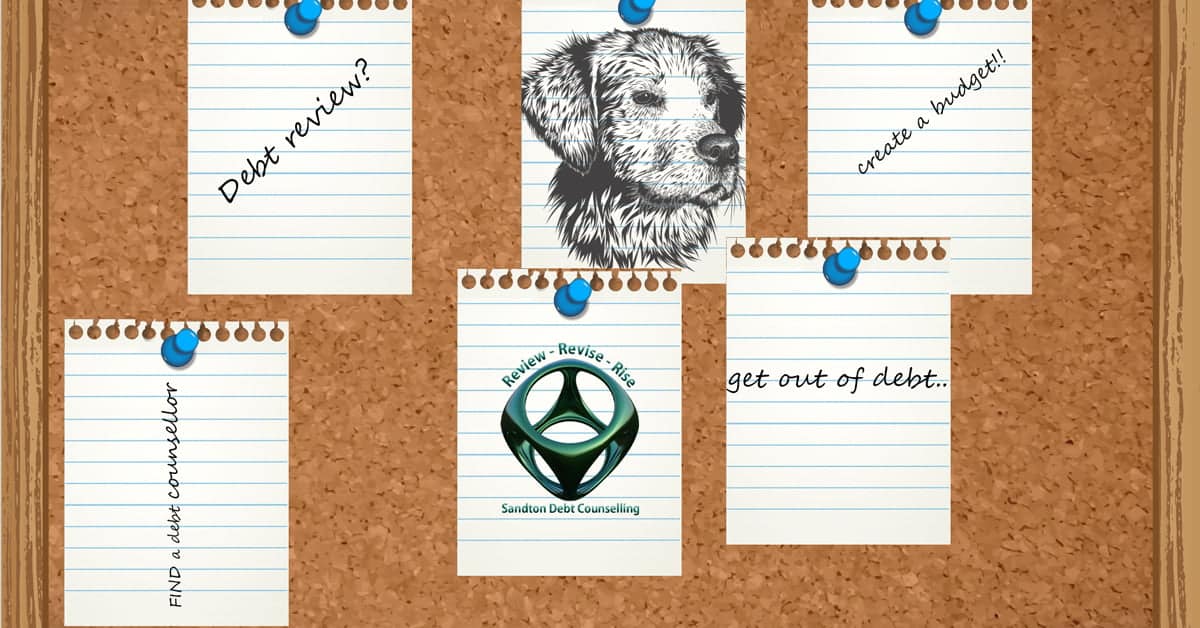
Demystifying the Debt Review Process: How to Take Control of Your Finances
By demystifying the debt review process, we will show you that managing your finances during the process is essential to ensure that you stay on track towards becoming debt-free.
Debt review - understand what it is
Debt review, also known as debt counseling, is a formal process designed to assist consumers who are struggling with their debts. It involves working with a reputable debt review company to develop a structured repayment plan that is affordable and manageable.
Debt review aims to protect consumers from legal action by their creditors while giving them an opportunity to repay their debts in a way that suits their financial situation.
Debt review is a regulated process governed by the National Credit Act. It is available to individuals who are over-indebted, meaning they are unable to meet their financial obligations every month or starting to see that they might be unable to pay debts in a couple of months.
By entering debt review, you can benefit from legal protection against repossession of assets and legal action by your creditors. This process provides individuals with the opportunity to regain control of their finances and work towards becoming debt-free.

Signs that you may need debt review
It can be challenging to determine whether you need debt review or if you can manage your debts on your own. However, there are some signs that indicate you may benefit from the debt review process.
If you find yourself struggling to make monthly debt repayments, constantly relying on credit to cover your living expenses, or receiving numerous collection calls from creditors, it may be time to consider debt review.
Additionally, if you're experiencing high levels of stress and anxiety due to your financial situation or if you're using one credit facility to pay off another, these are further indications that debt review may be a suitable option for you.
Benefits of going through the debt review process
Entering into the debt review process offers several benefits that can help you regain control of your finances and work towards a debt-free future. One of the significant advantages is the legal protection it provides.
Once you're under debt review, your creditors cannot take legal action against you or repossess your assets. This protection gives you peace of mind and allows you to focus on repaying your debts without the fear of aggressive collection tactics.
Additionally, debt review provides a structured repayment plan that is tailored to your unique financial situation. This plan allows you to make affordable monthly repayments, ensuring that you can meet your financial obligations while still covering your essential living expenses.
Furthermore, debt review can help to reduce the interest rates on your debts, making them more manageable and easier to repay. Overall, going through the debt review process can provide you with the necessary support and resources to overcome your financial challenges and achieve long-term financial stability.
Steps involved in the debt review process
The debt review process consists of several steps that are designed to help you manage your debts effectively. The first step is to contact a reputable debt review company and ask them to do an assessment for you.
The debt review company will assess your financial situation, including your income, expenses, and debts, to determine if you qualify for debt review. If you meet the criteria and agree to the interim payment plan, the debt review company will notify your creditors and the credit bureaus that you are under debt review.
This notification will prevent any further legal action or repossession attempts by your creditors. Once you are under debt review, the next step is to work with the debt counsellor to develop a repayment plan. This plan will outline the monthly repayments you need to make and will be based on your income and expenses.
The debt counsellor will negotiate with your creditors to reduce your interest rates and extend your repayment terms. Once the repayment plan is finalized, the debt counsellor will obtain a consent order to make the plan legal.
You will start making monthly payments to an NCR registered Payment Distribution Agency, who will distribute the funds to your creditors. This will be from the first month.
Throughout the debt review process, the debt review company will provide you with ongoing support and guidance to ensure that you stay on track towards becoming debt-free.

Finding a reputable debt review company
When it comes to debt review, it's crucial to work with a reputable and trustworthy debt review company. With so many companies offering debt review services, it can be challenging to determine which one is right for you. To find a reputable debt review company, start by doing thorough research. Look for companies that have been in the industry for a significant amount of time and have a proven track record of success. Check online reviews and testimonials from previous clients to get an idea of their reputation and the quality of their services. It's also essential to ensure that your debt counsellor is registered with the National Credit Regulator (NCR). The NCR regulates the debt review industry and ensures that companies adhere to strict ethical and professional standards. By working with a reputable debt review company, you can have confidence in the process and trust that you are in safe hands.
Common misconceptions about debt review
Debt review is often misunderstood, leading to several misconceptions. One common misconception is that debt review is the same as debt consolidation. While both processes aim to help individuals manage their debts, they are not the same. To consolidate, means to combine many things into one.
Debt consolidation involves taking out a new loan to pay off existing debts, whereas debt review is a formal process that provides legal protection and a structured repayment plan, while consolidating your accounts into one easy instalment. Those same accounts and creditors remain involved during debt review. So debt consolidation gives you one new loan, while debt review offers you a consolidated instalment that’s much lower than your current instalments.
Another misconception is that debt review will permanently damage your credit score. While it's true that entering into debt review will have an impact on your credit score, it's essential to understand that the primary goal of debt review is to help you become debt-free. You will not get an adverse listing on your credit profile, there will merely be a flag stating that no credit provider should grant new credit to you until the process is finalized by the debt counsellor issuing a debt clearance certificate.
By making regular repayments and completing the debt review process, you can begin rebuilding your credit score and working towards a healthier financial future. It's crucial to dispel these misconceptions and have a clear understanding of what debt review entails to make informed decisions about your financial situation.

Tips for managing your finances during the debt review process
- Create a budget:Developing a budget is crucial to understanding your income and expenses and ensuring that you can make your monthly debt repayments. Track your spending and prioritize essential expenses while cutting back on non-essential items.
- Communicate with your debt review company:Maintain open communication with your debt review company throughout the process. If you experience any changes in your financial situation, such as a loss of income or unexpected expenses, inform your debt counsellor immediately. In certain circumstances, they would be able to help.
- Seek financial advice:If you're unsure about any aspect of your finances or need additional support, consider seeking advice from a financial advisor. They can provide you with expert guidance and help you make informed decisions about your financial future. By following these tips, you can effectively manage your finances during the debt review process and work towards achieving your goal of becoming debt-free.
How to rebuild your credit score after completing the debt review process
Completing the debt review process is a significant accomplishment. You should be able to obtain new credit withing a couple of weeks. However, it's essential to understand that you should rebuild your payment profile and credit score to qualify for lower interest rates when applying for credit. Rebuilding your credit score after completing the debt review process requires a bit of time and effort. Here are some steps you can take to start rebuilding your score:
- Obtain your credit report: Request a copy of your credit report from the credit bureaus and review it for any inaccuracies or errors. Dispute any incorrect information to ensure that your credit report reflects your true financial history.
- Pay your bills on time: Making timely payments is one of the most crucial factors in rebuilding your credit score. Pay all your bills, including rent, utilities, and credit card bills, on time. Consider setting up automatic payments or reminders to avoid missing any payments.
- Use credit responsibly: If you're ready to start using credit again, do so responsibly. Apply for a credit card or a small clothing or furniture account and make regular, timely payments. Keep your credit utilization low and avoid maxing out your credit limits.
- Build an emergency fund: Having an emergency fund can help you avoid relying on credit in times of unexpected expenses. Aim to save at least three to six months' worth of living expenses in an easily accessible savings account.
By following these steps, you can gradually rebuild your credit score and improve your financial standing after completing the debt review process. It's important to be patient and consistent in your efforts, as rebuilding your credit takes time.
In short, to keep your credit score stable and even improve it- make sure to keep up with your repayments to other providers like rental agreements, insurances, cellphones etc. on a monthly basis.
Also consider adding more money to your debt review plan in your last two years to make yourself look even more attractive to creditors. Stable and consistent payments is what helps your score improve.

Alternatives to debt review
While debt review can be an effective solution for managing your debts, it's not the only option available. Depending on your financial situation, there may be alternative approaches that you can consider. Here are some alternatives to debt review:
- Debt consolidation: If you have multiple debts with high-interest rates, debt consolidation may be a suitable option. It involves taking out a new loan to pay off your existing debts, consolidating them into a single monthly repayment with the possibility of a lower interest rate.
- Debt settlement: Debt settlement involves negotiating with your creditors to settle your debts for less than the total amount owed. This option is typically suitable for individuals who have cash flow for now but suspecting that they might not be able to pay their accounts in a couple of months.
- Financial Advisor: Using a financial advisor can provide you with the guidance and the support you need to manage your full finances effectively. A financial advisor can help you create a budget, develop an informal repayment guideline, and provide advice on improving your financial situation. The advisor will act more like a coach, and it will still be up to you to implement their advice and deal with your creditors directly.
It's important to carefully consider your options and consult with a financial professional before deciding on the best approach for your specific circumstances. Each alternative comes with its own advantages and considerations, so it's crucial to choose the option that aligns with your goals and current financial situation.
Conclusion
Taking control of your finances and breaking free from the cycle of debt may seem daunting, but with the right knowledge and resources, it's possible. The debt review process, when approached with the guidance of a reputable debt review company, can provide you with the support and tools you need to manage your debts effectively.
The company also acts as an admin liaison to deal with your creditors on queries and resolutions while keeping an eye on payments and gathering necessary documents. This greatly reduces your stress as the debt counsellor would handle queries you might not know how to ask or answer. This provides you with confidence as a consumer.
By understanding the basics of debt review, recognizing the signs that you may need debt review, and exploring the benefits and steps involved in the process, you can take charge of your financial situation and work towards a brighter, debt-free future.
Remember to seek the assistance of a reputable debt review company, manage your finances effectively during the process, and take steps to rebuild your credit score after completing the debt review process. Consider alternative options if debt review is not suitable for you.
Now, after demystifying the debt review process, with determination and the right strategies in place, you can regain control of your finances and create a better financial future for yourself.
